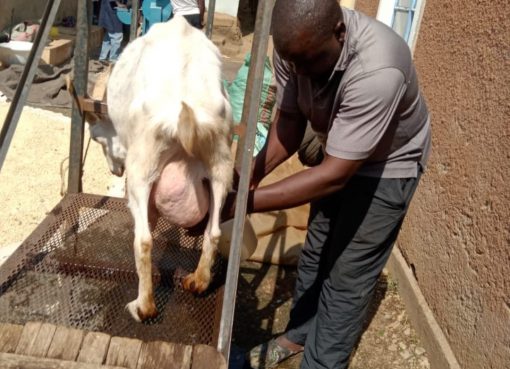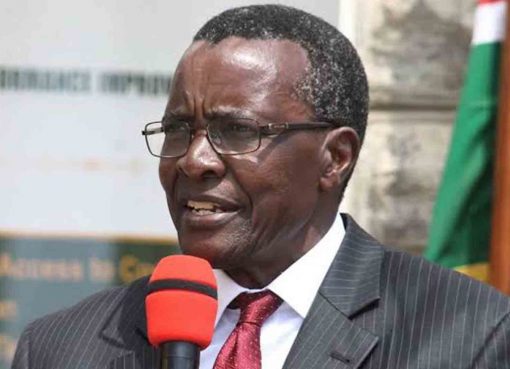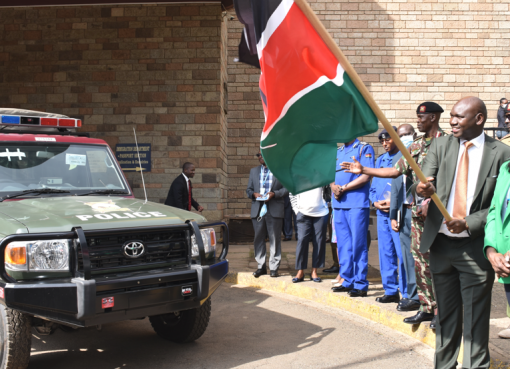The Head of Office of the United Nations High Commission for Refugees-Kakuma has called for concerted efforts from both the government and other donor partners to address the increasing number of school-going children in refugee camps joining school in Kakuma.
Nicolas Kaburuburyo, Head of Office UNHCR-Kakuma, said out of the 300,000 refugees in Kakuma, 162,000 were children of school-going age, adding that this called for the construction of more classrooms, the provision of books, and other resources that made learning possible.
“Due to instability in the region, especially in the DRC, Burundi, Somalia, and Sudan, we see every year children joining schools, and this calls for more classrooms, teachers, books, and other resources to enable them to access learning in a conducive environment,” Kaburuburyo said.
Kaburuburyo made the remarks when a mission team comprising the Ministry of Education and donor partners led by MOE Director—Directorate of Project Coordination and Delivery (DPCAD) Elijah Mungai visited the camp during the team’s three-day field visit to monitor and evaluate outcomes of the World Bank-funded Kenya Primary Education Equity in Learning Programme (KPEELP). About Sh45 billion has been injected into the programme.
Mr. Mungai said the government has partnered with the World Bank, the Global Partnership for Education, and other partners to reduce regional disparities in learning outcomes, improve the retention of girls in upper primary education, and strengthen systems for delivering equitable education outcomes.

“This is in line with the aspirations of Kenya’s Vision 2030, which puts emphasis on education and training systems as a vehicle to drive the country’s efforts towards becoming an upper-income economy,” he said.
The Director of DPCAD said KPEELP’s main focus was on the four key pillars of access and participation, equity and inclusiveness, quality and relevance, governance and accountability, and recognising girls education and refugees education as a cross-cutting issue.
Mr. Mungai said that in equalising learning opportunities in low learning outcomes, KPEELP has targeted 50 camp-based refugee schools by focusing on result-based grants, improving teacher deployment in target schools with the highest shortages, and supporting school meals for vulnerable learners.
To improve girls participation in schooling, including in refugee hosting counties, the Director said KPEEL had removed financial barriers to school attendance and that the programme was meeting basic needs for girls and boys from poor backgrounds, vulnerable learners with disabilities, and refugee children.
“We also track girls at risk of dropping out of school and facilitate the re-entry of enrolled girls who dropped out of school due to pregnancy. There are also psychosocial challenges such as language barriers and trauma that we are addressing to ensure children remain in school,” he said.
The director further called for better utilisation of funds and asked for the formation of Board of Management in schools to strengthen their capacity in governance, indicating that that will help in proper financial management and accountability for funds disbursed to schools.
He further said that the construction of new classrooms in existing schools was a needs-based infrastructure investment plan, saying each school has its own priority areas.
Shasani Augustine, a form-one student at Tarach Secondary and refugee from the DRC, applauded the scholarship programme and the efforts by the government to ensure the refugees accessed education. He said many children were suffering because of bad politics in unstable countries.
“I want to study hard, become a politician, and go back to my country to change the politics of my country because it is bad politics that is causing all this trouble for us,” Shasani said.
While visiting Bishop Mahon Teacher Training College in Lodwar, Mungai said through KPEELP Teacher Training colleges will be strengthened to ensure that teachers who graduate from those institutions acquire the core competencies, including the retooling of tutors and the establishment of ICT-enabled learning resource centres to ensure teachers implement competency-based curriculum and CBA.
The National Coordinator of KPEELP, Martha Ekirapa, encouraged the Elimu scholarship students to redouble their efforts in studies, pointing out that she too was a beneficiary of the Action Aid sponsorship that saw her in later 80s go through her studies from secondary to university, which changed her status.
“Do not give your background as an excuse for not working hard. Seize the opportunity given by this scholarship and change your life,” said Ekirapa, National Coordinator at KPEEL.
Other schools visited in Kakuma and Kalobeyei included Ngudeng Primary, Kamuka Mixed, Nationakar Primary, Friends Primary, Our Lady Secondary School, and Tarach Secondary School.
Other mission team members included Martha Ekirapa, National Director of KPEELP, and Ruth Charo from the World Bank.
By Cyrilla Barasa and William Inganga





